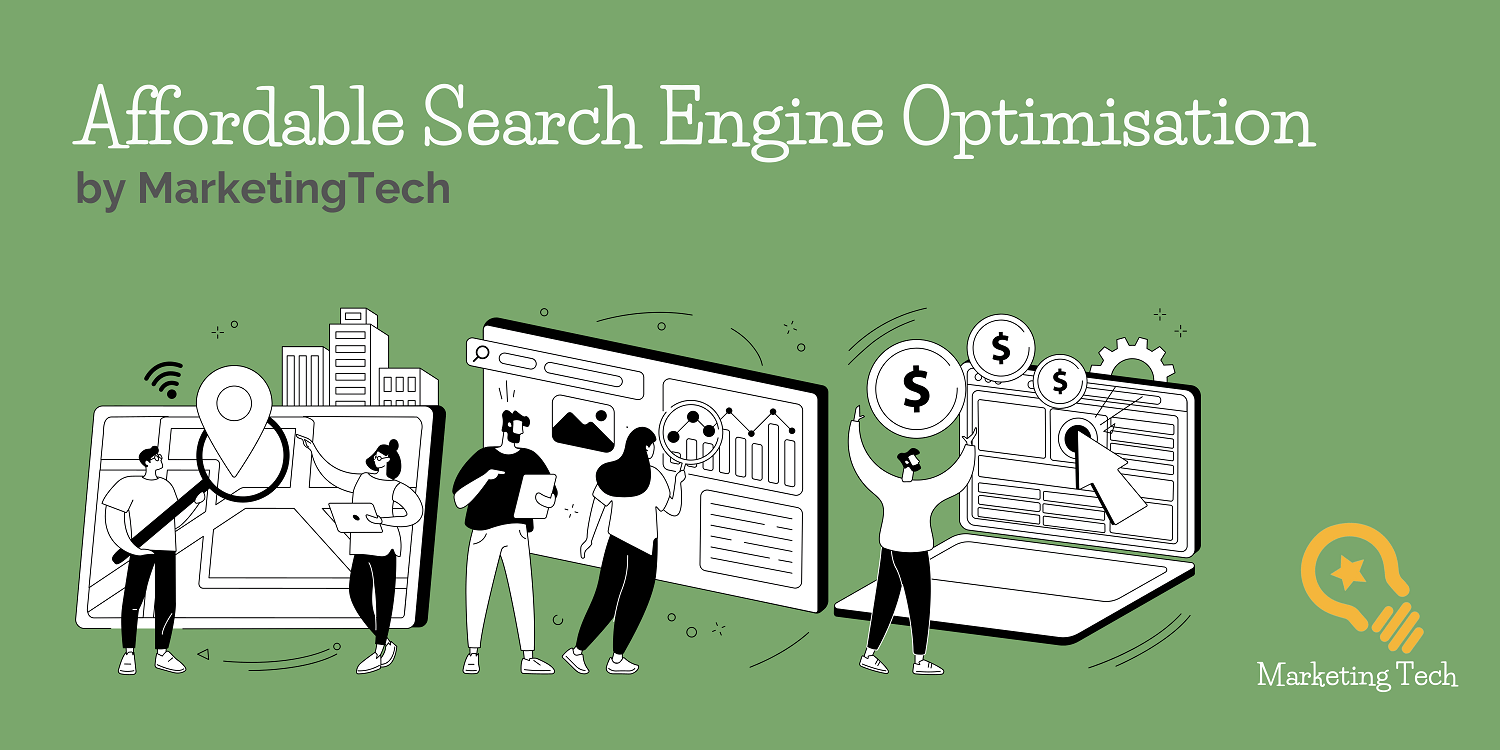In today's digital age, having a strong online presence is essential for businesses and individuals alike.

Whether you run a small business that relies on local customers, or a large e-commerce website, Search Engine Optimisation (SEO) plays a crucial role in improving your visibility on search engines like Google.
If done properly, you’ll ultimately reap the benefits of SEO which is more visibility, more traffic for the right keywords, more enquiries which will lead to more sales.
Don't worry if you're not a tech-savvy expert; this blog will provide you with some do-it-yourself SEO tips that anyone can implement to enhance their website's ranking.
- Understanding SEO
- Keyword research
- On-page optimisation
- Technical SEO
- Link building
- How does Google rank a website?
- SEO resources to help you get started
- Conclusion
- Get your free SEO reports
Understanding SEO
Let's start with the basics. SEO is the practice of optimising your website so that search engines can easily understand and rank its content. When someone searches for a specific topic or keyword, search engines use complex algorithms to determine the most relevant and valuable websites to display in the search results.
By optimising your website, you increase the chances of appearing higher in those search results, ultimately driving more organic traffic to your site.
Keyword Research
Keywords are the foundation of SEO. They are the words and phrases people type into search engines when looking for information. To effectively optimise your website, you need to identify the keywords relevant to your content. Start by brainstorming words and phrases that your target audience might use to find your website.
Then, use online keyword research tools like Google Keyword Planner or Ubersuggest to discover popular and relevant keywords in your niche.
On-Page Optimisation
On-page optimisation refers to the process of optimising individual web pages to improve their ranking and visibility. Here are a few key on-page optimisation techniques:
Title Tags: Ensure each page on your website has a unique and descriptive title tag that includes your target keyword. This helps search engines understand the content of your page.
Meta Descriptions: Write compelling meta descriptions that accurately summarise the page's content and entice users to click on your link in the search results. While meta descriptions don't directly impact rankings, they can greatly affect click-through rates.
Heading Tags: Use heading tags (H1, H2, H3, etc.) to structure your content. These tags help search engines understand the hierarchy and importance of the information on your page.
Content Optimisation: Create high-quality, valuable content that satisfies the user's search intent. Incorporate your target keywords naturally throughout your content, but avoid keyword stuffing, as it can harm your rankings.
Image Optimisation: Optimise your images by using descriptive file names and adding alt text. This helps search engines understand the images and can improve your website's visibility in image search results.
Technical SEO
Technical SEO focuses on the backend aspects of your website that affect its visibility and usability. While it may sound complex, there are a few simple steps you can take to improve your site's technical SEO:
Site Speed: Optimise your website's loading speed by compressing images, minifying code, and using caching techniques. A faster website not only improves user experience but also positively impacts search engine rankings.
Mobile-Friendliness: Ensure your website is mobile-friendly and responsive. With the majority of internet users accessing the web via mobile devices, search engines prioritise mobile-friendly websites in their rankings.
URL Structure: Create clean and descriptive URLs that include your target keywords. Avoid using lengthy URLs with unnecessary parameters.
XML Sitemap: Generate an XML sitemap and submit it to search engines like Google. A sitemap helps search engines crawl and index your website more effectively.
Link Building
Link building is the process of acquiring external links from other websites back to yours. These backlinks act as "votes of confidence" for your website and can improve your rankings. Here are a few strategies to build quality backlinks:
Content Creation: Create valuable and shareable content that other websites would want to link to. It could be informative blog posts, infographics, or even videos.
Guest Blogging: Contribute guest posts to reputable websites in your industry. In return, you'll usually receive an author bio with a link back to your website.
Social Media: Promote your content on social media platforms to increase its visibility. If your content is valuable, people are more likely to link to it.
Influencer Outreach: Reach out to influencers or industry experts and ask them to share your content. Their endorsement can lead to valuable backlinks and increased exposure.
How does Google rank a website?
Your website’s ability to rank isn’t dependent on one or two factors, but rather a range of factors, from your site’s user friendliness, to its technical robustness and the relevance of your content.
In other words, all of what we’ve discussed contribute, to varying degrees, to how well your website ranks against others.
SEO Resources to help you get started
If you have some time, here are a few to start with:
1) Neil Patel – he’s the American guru of search. Start with his free newsletter or his YouTube channel as there’s loads of value there.
2) Google Analytics or GA4 - you need to have some form of analytics on your website to help you collect data and draw conclusions about how people are using your site.
3) Google Search Console - helps you diagnose any technical SEO issues. It can also help you understand your most popular pages, see where you are ranking and help you increase your organic traffic.
4) Set up Google Business Profile and Bing Places – free advertising tools, especially good if you operate from a physical location/s where you see your customers.
5) Brightlocal – helps you set up directory listings, which are highly trusted websites/directories that allow you to list your business information (name, address and phone number with your home page link to them). Many are free to list.
Conclusion
Search engine optimisation doesn't have to be overwhelming or intimidating. By implementing these do-it-yourself SEO tips, you can enhance your website's visibility and attract more organic traffic.
Remember, SEO is an ongoing process, so monitor your progress, adapt to changes, and continue to improve your website's optimisation. With dedication and consistency, you'll be on your way to climbing the search engine rankings and reaching a wider audience.
No time to do all of that and would like some help?
Here’s what we’ll suggest that’ll help you: download a copy of your free local SEO report or get a free general SEO audit done by us, at no obligation.
What you'll get from our Free SEO Reports
Loads, actually. To give you a flavour, below are three of my favourite insights you'll get when you download your Local SEO audit report. However…
if your business isn’t reliant on local customers or you’re an online business, we are able to provide you with a Free General SEO audit too. Just let us know by emailing us at I'd like a free general SEO audit please.
Three insights you’ll get from your local SEO report:
1) The positions ('rankings') that your website appears in for your important keywords. You'll get local search results from the two largest search engines (Google and Bing), and on Google Maps and Bing Local which are your free local listing opportunities.
2) Your Google Business Profile Audit. This benchmarks your website against the top 10 ranked businesses in your area.
3) On-Site SEO factors that affect your ability to rank high in search engines - this is a short but revealing overview of the full technical audit we normally provide. On-Site SEO factors are elements of your website, either visible on the page or in the code of your website (which you can't see, but search engines can), which affect the site's search rankings.
It's easier to improve SEO factors on your own site because you have control over it.
And more from the report. This is a great overview of your local online presence, offered to you free as we want to make sure you get the chance to review the health of your website.
Perhaps you've already downloaded an SEO report in the past, and are wondering if you still need this? Google constantly updates its search algorithm so that pages that ranked well previously may no longer do so, or you may have updated your website since and would like to know how it's performing now.
This report will provide you with fresh insights you haven't yet seen.
Download the Local SEO Report and do let us know how you get on with it.
To your Success,
Joyce from MarketingTech
MarketingTech offers affordable SEO (Search Engine Optimisation) services for professional services firms.
We take a humanly strategic, relentlessly forensic and AI-powered approach to SEO. We help your business be found so that you’ll generate the right enquiries to your site.
We’ve helped coaches, security services and healthcare companies improve their site health, get ranking where it matters so that they’ll generate qualified leads.
Get in touch – download a snapshot of your website’s online footprint now or book a call with us.
